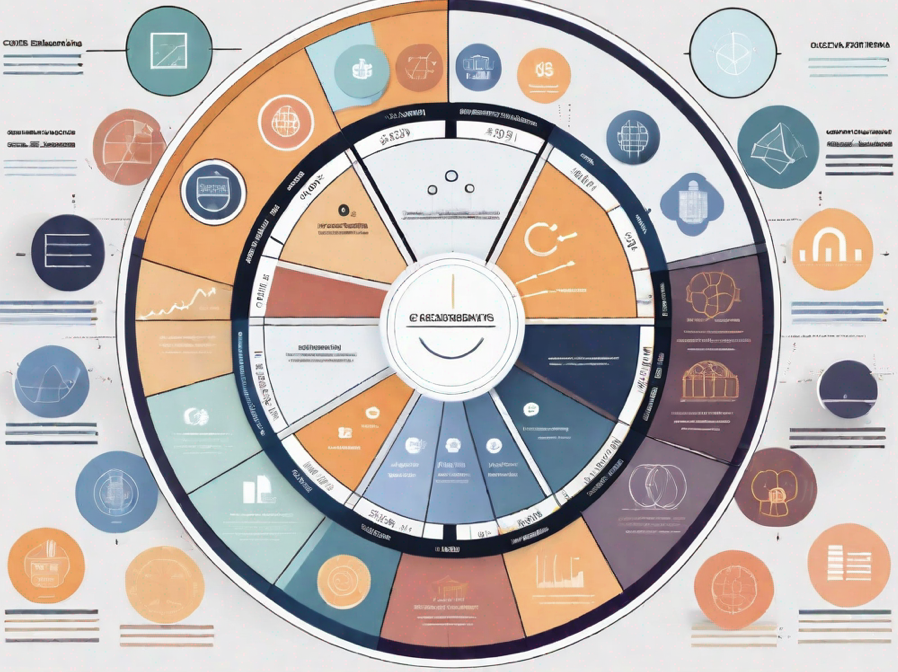Cash Basis Accounting vs. Accrual Basis Accounting: what’s the Difference?
Discover the critical distinctions between cash-based accounting and accrual-based accounting in this informative article.

Cash basis accounting and accrual basis accounting are two primary methods used to record financial transactions in businesses. Understanding the differences between these two methods is essential for business owners and individuals who want to manage their finances effectively. In this article, we will explore the various aspects of cash-based accounting and accrual-based accounting to help you determine which method is right for your company.
How to Determine Which Accounting Method is Right for Your Company
Before we delve into the differences between the two accounting methods, it’s important to assess your company’s unique situation and needs. Consider the size and nature of your business, as well as your revenue and expenses. Additionally, take into account any legal or regulatory requirements that may influence your choice of accounting method.
If your company is a small business or a startup with limited transactions, cash-based accounting might be suitable. Cash-based accounting is a method where revenue and expenses are recognized when cash is received or paid out. This method provides a simple and straightforward way to track your company’s financials. It is especially beneficial for businesses with low transaction volumes, as it eliminates the need to track accounts receivable and accounts payable.
However, if your business is more complex, with a high volume of transactions, accrual basis accounting may be more appropriate. Accrual basis accounting is a method where revenue and expenses are recognized when they are earned or incurred, regardless of when cash is received or paid out. This method provides a more accurate representation of your company’s financial position and performance, as it takes into account all economic activities, even if cash has not yet been exchanged.
Accrual basis accounting is often required for businesses that need to comply with generally accepted accounting principles (GAAP) or international financial reporting standards (IFRS). It is also beneficial for businesses that have significant accounts receivable or accounts payable, as it allows for better tracking and management of these transactions.
When deciding between cash basis and accrual basis accounting, it’s important to consider the long-term goals and growth plans for your company. If you anticipate significant growth in the future, accrual-based accounting may provide a more accurate picture of your company’s financials and help you make informed business decisions.
The Key Differences Between Cash Basis and Accrual Basis Accounting
When it comes to accounting methods, there are two primary approaches: cash-based accounting and accrual-based accounting. While both methods serve the purpose of tracking a company’s financial transactions, there are significant differences in how revenue and expenses are recognized. Let’s delve deeper into these differences to gain a better understanding of each method.
Cash basis accounting, as the name suggests, records revenue and expenses when cash is received or paid, respectively. This method is straightforward and simple, making it a popular choice for smaller businesses or individuals who prefer a more straightforward approach to their financial records. With cash-based accounting, if you receive payment for a service or product today, you record the revenue today. Similarly, if you pay a bill or expense today, you record it as an expense today.
On the other hand, accrual basis accounting takes a different approach. It recognizes revenue when it is earned, regardless of when cash is received, and expenses are recognized when they are incurred, regardless of when cash is paid. This method provides a more accurate picture of a company’s financial position and performance, which is crucial for larger organizations or those seeking a more comprehensive understanding of their financial health.
Accrual basis accounting allows businesses to match revenue with the expenses incurred to generate that revenue. For example, if a company provides a service to a customer in January but does not receive payment until February, under the accrual basis method, the revenue would be recognized in January when the service was provided. This approach provides a more accurate representation of the company’s financial performance during a specific period, even if the cash flow does not align precisely.
Another significant difference between cash-based and accrual basis accounting is the treatment of accounts receivable and accounts payable. Cash basis accounting does not consider these items, as it only focuses on cash transactions. In contrast, accrual basis accounting includes accounts receivable and accounts payable in its records. This distinction can significantly impact a company’s financial statements and its ability to track outstanding payments and debts.
By including accounts receivable and accounts payable, accrual basis accounting provides a more comprehensive view of a company’s financial obligations. It allows businesses to monitor outstanding payments from customers and outstanding debts to suppliers or vendors. This information is crucial for managing cash flow, making informed business decisions, and maintaining healthy relationships with stakeholders.
Recognizing the Tax Implications of Each Accounting Method
When it comes to taxes, your choice of accounting method can have a significant impact on your obligations and liabilities. In some jurisdictions, the tax code may require businesses to use one method over the other, depending on their size or industry.
Typically, cash-based accounting offers more immediate tax advantages since income is only taxed when received, and expenses are deductible when paid. It can be particularly beneficial for smaller businesses with consistent cash flows.
On the other hand, accrual-based accounting can provide a better long-term view of your tax liabilities. By recognizing revenue and expenses as they are incurred, you can plan your tax strategy more effectively and measure your profitability accurately.
Is cash or accrual accounting best for taxes?
There is no one-size-fits-all answer to whether cash or accrual accounting is best for taxes. It depends on various factors, including your business structure, industry, size, and cash flow patterns. Consulting with a tax professional can help you understand the tax implications of each method and make an informed decision.

What to Consider Before Choosing an Accounting Method
When deciding between cash-based accounting and accrual-based accounting, it’s vital to consider several factors.
1. Business Size: Cash-based accounting is often suitable for small businesses, while accrual-based accounting is more common for larger organizations.
2. Financial Reporting Needs: Accrual basis accounting is recommended if you require accurate financial statements and a more comprehensive view of your company’s performance.
3. Cash Flow Management: Cash-based accounting allows for easier tracking of cash inflows and outflows, making it beneficial for businesses with irregular cash flow patterns.
4. Taxation Requirements: Certain tax laws and regulations may dictate which accounting method you must use, so it’s essential to research the specific requirements in your jurisdiction.

Is it difficult to switch from cash to accrual accounting, or vice-versa?
The process of switching from one accounting method to another can be complex, especially if your business has been operating under one method for an extended period. It’s important to consult with an accounting professional to ensure a smooth transition and avoid any potential discrepancies or errors in your financial records.
Is cash basis accounting GAAP compliant?
Cash basis accounting is not generally considered Generally Accepted Accounting Principles (GAAP) compliant as it does not provide a complete and accurate representation of a company’s financial health and performance. GAAP requires the use of accrual basis accounting for financial reporting purposes. However, there are exceptions for small businesses that meet certain criteria. Consult with a qualified accountant or financial advisor to determine if cash-based accounting is suitable for your specific circumstances.
Examining the Impact of Each Accounting Method on Financials
The accounting method you choose can significantly impact your business’s financial statements, including the balance sheet, income statement, and cash flow statement. With cash basis accounting, your financial statements will reflect actual cash inflows and outflows. This method can be helpful for managing day-to-day operations and understanding your immediate cash position.
Accrual-based accounting, on the other hand, provides a more comprehensive view of your business’s financial health by matching revenue and expenses to the period in which they are earned or incurred. This method allows for more accurate forecasting, decision-making, and comparison with industry standards.
Cash Basis Accounting Examples
Accrual Basis Accounting Examples
Let’s consider a few examples to illustrate cash basis accounting:
1. A small consulting firm receives a $5,000 payment for services rendered in January. The revenue will be recognized in January when the cash is received.
2. A retail store purchases inventory worth $2,000 and pays for it in cash. The expense will be recognized in the same period when the payment is made.
Here are a couple of examples to highlight accrual basis accounting:
1. A software development company completes a project worth $10,000 in December but receives payment in January. The revenue will be recognized in December when the project is completed, even if the cash is received later.
2. A manufacturing company incurs $3,000 in utility expenses in October but pays the bill in November. The expense will be recognized in October when it is incurred, not when the payment is made.
Accrual Basis Accounting Examples
Accrual Basis Accounting Examples
Here are a couple of examples to highlight accrual basis accounting:
1. A software development company completes a project worth $10,000 in December but receives payment in January. The revenue will be recognized in December when the project is completed, even if the cash is received later.
2. A manufacturing company incurs $3,000 in utility expenses in October but pays the bill in November. The expense will be recognized in October when it is incurred, not when the payment is made.
Choosing the right accounting method for your company requires careful consideration of your company’s size, nature, revenue, expenses, and legal requirements. Whether you opt for cash-based accounting or accrual-based accounting, it’s important to ensure that your chosen method aligns with your company’s goals and provides accurate and reliable financial information.
While cash basis accounting is simpler and more straightforward, accrual basis accounting offers a more accurate representation of a company’s financial position and performance. The inclusion of accounts receivable and accounts payable in accrual basis accounting provides a more comprehensive view of a company’s financial obligations. Ultimately, the choice between cash basis and accrual basis accounting depends on the size and nature of the business, as well as the specific financial reporting needs.

IN CONCLUSION
While cash-based accounting is simpler and more straightforward, accrual basis accounting accurately represents a company’s financial position and performance. The inclusion of accounts receivable and accounts payable in accrual basis accounting provides a more comprehensive view of a company’s financial obligations. Ultimately, the choice between cash-based and accrual basis accounting depends on the size and nature of the business, as well as the specific financial reporting needs. Ultimately, the choice between cash-based and accrual-based accounting depends on your specific business circumstances, reporting needs, and long-term goals. To make an informed decision, it’s crucial to assess the advantages and disadvantages of each method and consult with an accounting professional if needed. By selecting the right accounting method, you can effectively track your financial transactions, comply with regulatory requirements, and make informed business decisions.
It All Starts With a FREE consultation!
Every client’s needs are unique and require varying amounts of time and attention. You can use this form to let us know what you’re looking for, and we’ll reach out to you to schedule an appointment and talk about rates for your business needs.
Please be as detailed as possible with what work is needed, what industry your business is in, and where you are located.
Our team will contact you with in 2 business days to set up the first meeting. We will make sure all your needs are taken into account when selecting the package and type of services you need.









Stay In Touch